Apple finally released some new iPads this year after going over a year without any updates. The iPad Air got a big refresh, now with an M2 chip inside and a new size — 13 inches — to go along with the regular 11-inch size from before.
The new iPad Air starts at $599 for the 11-inch Wi-Fi base model and increases depending on the size and configuration you choose. If you want the new 13-inch model, be prepared to spend at least $799.
As great as the new iPad Air is, it’s not the only tablet on the market. Here are five other options you can consider instead.
iPad Pro (2024)
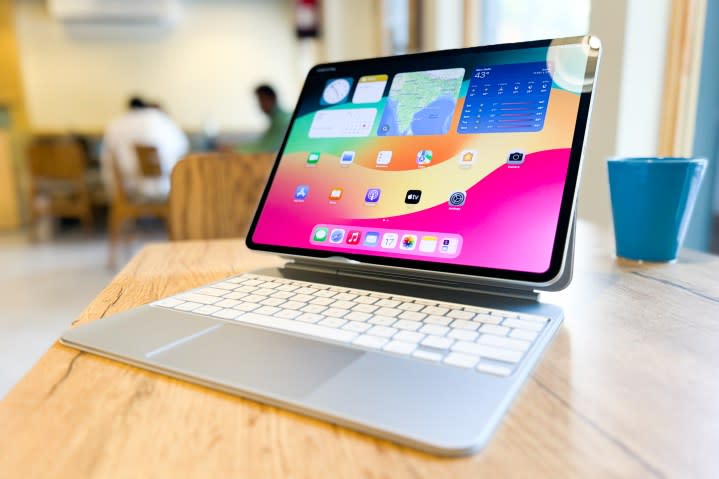
The iPad Air wasn’t the only new iPad that Apple gave us this year — we also have the new iPad Pro (2024). If you can afford it, the Pro models do have some pretty great upgrades over the Air.
For one, the iPad Pro also comes in the same 11-inch and 13-inch sizes that the Air now comes in. However, the iPad Pro takes things a step further with a new OLED display, a first on the iPad, which means you get deeper blacks, brighter colors, and an overall sharper display.
If you go with the 1TB or 2TB model, you have the option for a new nano-texture finish. With the nano-texture, it is an antireflective coating that helps to reduce glare. Though this might mean blacks aren’t as deep as the standard glossy display, it can definitely help when you are doing work on iPad Pro.
The iPad Pro is also the debut device for the powerful M4 chip, which hasn’t even made it into a Mac yet. With the M4 chip, you get the same powerful performance as the M2 but with better thermals, all while using half the power. According to Apple, it has the same performance level as a thin-and-light PC but at a quarter of the power.
The M4 chip is also a solid foundation for powerful AI tasks thanks to the new Neural Engine it uses. Hopefully this means we get some solid AI upgrades and features in iPadOS 18 that will take advantage of this chip’s power.
The iPad Pro (2024) is an expensive tablet, and quite a bit more costly than the new iPad Air. But if you want the best, most capable iPad available in 2024, it’s the one to get.
iPad Air (2022)
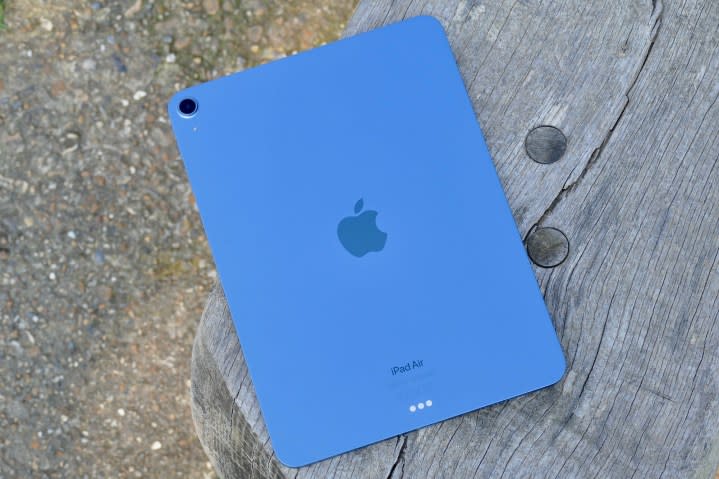

Still want an iPad Air but don’t need the bells and whistles of the new model? The 2022 iPad Air model is still a perfectly capable device that shouldn’t be overlooked. Plus, you can save some money by going with this one now that the new model is out.
The iPad Air (2022) has the M1 chip, which is a few years old but is still a very fast and powerful chip for a tablet. Though the M2 gives a 50% boost in performance over the M1, for most people the M1 is likely more than enough. After all, most people likely use the iPad for checking email, messages, social networks, consuming media, and playing games. The M1 can handle all of that without a problem.
Though the iPad Air (2022) only has one size, it still has a beautiful and crisp screen. You also have a 12MP rear camera and a front-facing 12MP camera that is at the top of the device in portrait orientation. There’s still USB-C charging and support for the Apple Pencil 2 and Magic Keyboard, so you can get some serious work done on it. The 64GB base storage may be a pain point, so it’s recommended to go for a larger storage option if you can.
Despite being two years old, the iPad Air is still a capable machine that’s suitable for most people. If you don’t need the M2 chip or a 13-inch iPad Air, then you can definitely save some money by picking up an older iPad Air instead.
iPad (2022)
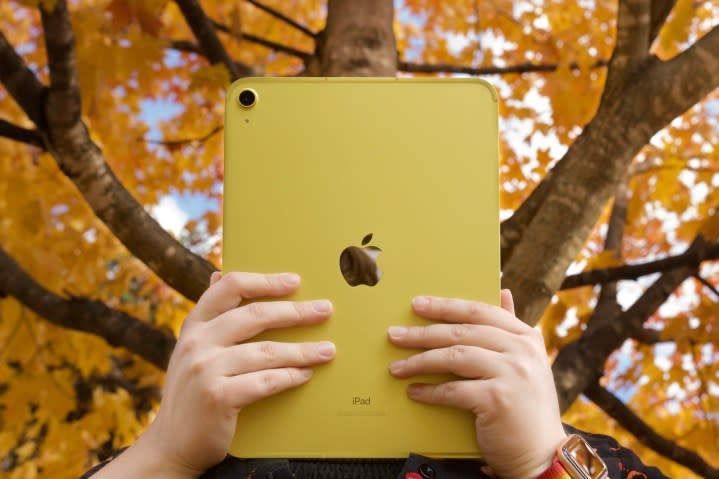

When the 10th-generation iPad came out in 2022, it was in a bit of an awkward situation. That’s because Apple continued to sell the ninth-generation iPad for a lower price, and the $450 asking price for the 10th-gen was a bit of a high ask.
But that’s different now that the ninth-generation iPad is completely out of the picture, as Apple no longer sells it. Because of that, the 10th-generation iPad from 2022 got a price drop to just $350, making it much easier to recommend.
The 10th-gen iPad got rid of the relic home button, so it now uses Touch ID in the power button at the top of the frame. You also have a front-facing camera in landscape orientation, which makes sense for video calls, especially with Center Stage. The iPad also has USB-C charging, which is in line with the rest of Apple’s product lineups that have now all switched over to USB-C for the iPhone, iPad, and Mac.
Since the iPad no longer has a home button, it has a larger display with thinner bezels, making it perfect for media consumption. Though it’s not the best display since it’s still an LED panel, it’s not bad by any means and good enough for most people.
The iPad still uses Apple’s older A14 Bionic chip, which first launched on the iPhone 12 lineup and 2020 iPad Air. It may not be the newest or fastest chip out there, but it’s perfectly fine for media consumption, checking social networks, and playing some games.
The iPad (2022) supports the first-gen Apple Pencil and the Apple Pencil USB-C. It doesn’t support the Magic Keyboard, but there is the Magic Keyboard Folio, which is more versatile overall and lets you be productive with the keyboard and trackpad.
When the iPad (2022) first launched, it was a weird recommendation. But now that it has a price drop and is still a great tablet for the average person, it’s a solid alternative to the iPad Air (2024).
OnePlus Pad
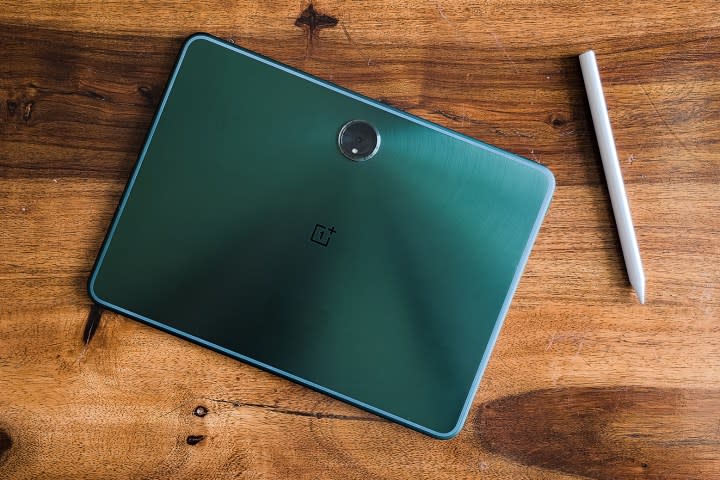

Don’t mind switching over to Android? Then the OnePlus Pad remains one of the best tablets you can get on the market.
The OnePlus Pad’s design definitely stands out in the crowd of boring tablet colors and basic glass slabs. It has a unique Halo Green color with a brushed metal look and a circular pattern on the back, similar to a vinyl record. It’s also a slim design, lightweight, and honestly quite comfortable to hold.
OnePlus shipped the OnePlus Pad with OxygenOS 13 on it, and has promised three years of Android OS upgrades and four years of security patches. It should be upgradeable to Android 16, which will likely arrive later next year. OxygenOS 13 runs smoothly on the OnePlus Pad, and it has great multitasking capabilities so you can maximize productivity — especially when paired with the OnePlus Magnetic Keyboard and OnePlus Stylo.
Spec-wise, the OnePlus Pad is impressive with 8GB RAM and MediaTek Dimensity 9000, one of the higher-end MediaTek chipsets. One of the big features of the OnePlus Pad is the ability to have up to 24 live apps running simultaneously. The average person may not ever have 24 apps on the screen at once, but it’s a nice feature to have.
Lastly, the OnePlus Pad has some of the best battery life on a tablet. The 9,510mAh battery can get over 12 hours of consecutive binge-watching video sessions and a very impressive one month of standby time. No accessories or background apps? Then the battery can last around 50 days. And when you do need to charge up, it has 67W wired charging, so you can go from zero to 100% in about 80 minutes.
Samsung Galaxy Tab S9 FE Plus
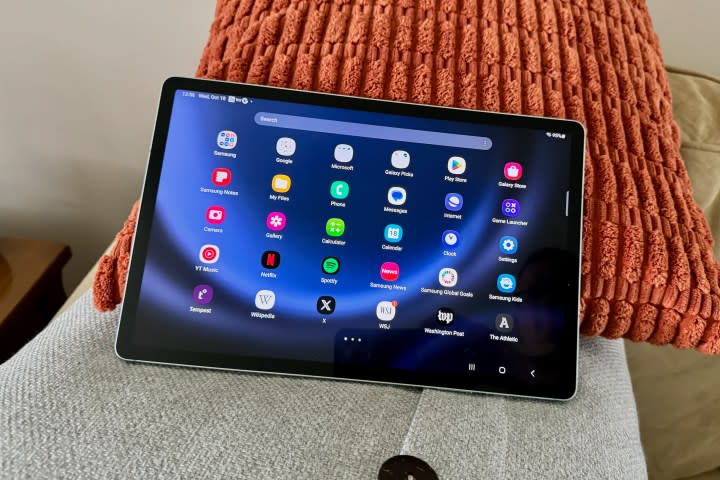

Those who were thinking about getting a 13-inch iPad Air (2024) could also consider the Samsung Galaxy Tab S9 FE Plus, as long as you don’t mind Android. You get a similar-sized 12.4-inch tablet without breaking the bank.
With the Samsung Galaxy Tab S9 FE Plus, you have a 12.4-inch WQXGA display that provides a pleasing viewing experience with rich and lush colors and a sharp resolution. It also has a 90Hz refresh rate. It’s not 120Hz, but it is a step up from the 60Hz screen on the iPad Air. This means scrolling should be a bit smoother than on the iPad Air.
Though it doesn’t use a Snapdragon chip and has an Exynos 1380 chipset instead, it still has good midrange performance with up to 12GB RAM. It shipped with Android 13 and Samsung One UI 5.1.1 but has since been updated to Android 14. The Samsung Galaxy Tab S9 FE Plus also uses Samsung DeX, which replaces the Android interface with one that is more akin to a desktop computer like Windows or macOS. With DeX, it makes it a bit easier to be more productive on your tablet, but it also depends on whether the apps you use will work nicely with it.
The Samsung Galaxy Tab S9 FE Plus’s battery life is also good. With continuous use such as video watching, you can get between 18 and 20 hours on a single charge of the 10,090mAh battery. It also charges up quickly, getting a full charge in under 90 minutes.
There’s a lot to like about the Samsung Galaxy Tab S9 FE Plus, especially the price, if you’re looking for a larger tablet without spending too much.
Source Agencies



